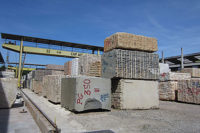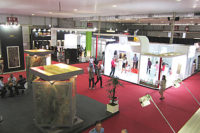
Cajugram’s factory is located on nearly 250
acres in Mimoso do Sul, Espírito Santo,
Brazil, with
120,000 square feet of built area.
When it was first established in early 1990, Cajugram of Mimoso do Sul, Espírito Santo, Brazil, operated two gangsaws with the intent of supplying stone for the local domestic market. A few years later, the firm had the opportunity to invest in more technology - adding slab polishing equipment and tile lines - and the company started to export polished granite slabs and tiles to North America and South America. Today, Cajugram is one of Brazil’s largest stone suppliers.

The company processes a broad range of stone
types, ranging from basics to exotics.

Machinery at Cajugram’s factory includes 17
gangsaws from Cimef and MGM of Brazil.

The factory also has four bridge saws from
Zonato of Italy and Coch of Argentina and three automatic polishing machines
from MGM.
Quarrying Operations
Cajugram quarries 17 types of granite, and the quarry sites are located in several different states, including Espírito Santo to Minas Gerais, Bahia and Goias.Materials from Cajugram’s quarries include: Brazilian Black, Amazon Green, Ipanema Beige, Icaraí Yellow, Santa Cecília, San Francisco Yellow, Giallo Renoir, Giallo Portinari, Giallo Monet, Giallo Platinum, Golden Storm, Bordeaux Light, Versace, Coral Spring, Goiás Pink, Brasília Red and Kilimanjaro.

The company has 100 employees working at its
main factory.
An average of 12 employees are at work in each quarry, with a total of 200 quarrymen employed by the company. In all, the quarries produce approximately 1,500 cubic meters of material each month.

A total of 85% of Cajugram’s sales comes from
slab production.
Stone Processing
Cajugram’s factory is located on nearly 250 acres, with 120,000 square feet of built area. Machinery includes 17 gangsaws from Cimef and MGM of Brazil; three automatic polishing machines from MGM (two with 16 heads and one with 20 heads); two tile lines from Coch of Argentina; four bridge saws from Zonato of Italy and Coch; a CNC stoneworking center from Comandulli of Italy; a countertop line from Breton of Italy; a semi-automatic resin-treatment line from Roch Industrial of Brazil; a mono-diamond wire saw from Rochaz of Brazil; and a multi-diamond wire saw for processing blocks into slabs from Wires Engineering of Italy.
Maintaining a high level of quality control is a
priority for Cajugram.

Cajugram has also fabricated stone for
large-scale cut-to-size projects around the world.

The company has 100 employees working at its
main factory (in addition to the quarry workers). Besides the factory at the
company headquarters at Mimoso do Sul, there is another small factory with five
gangsaws located near Cachoeiro de Itapemirim, Espírito Santo, and a second
branch located at Brasilia/DF, the Brazilian capital.
Sales and Marketing
A total of 85% of Cajugram’s sales comes from slab production, with 10% tile or cut-to-size sales and 5% block sales. In all, the company processes 555,000 square feet of material. Of this, 65% is exported, and 35% is sold within the domestic market.Cajugram exports about 70 containers per month, and it intends to increase that total to 150 containers over the next two years. Also in the future, Cajugram expects a shift in production to 60% slabs, 20% tiles and 20% cut-to-size work.

In a high-profile application, Cajugram
processed stone for the exterior of the Brasil XXI Complex in the Federal
District of Brasilia, Brazil’s capital city.

Cajugram has also fabricated cut-to-size work
for interior projects.
In terms of slab sales, Cajugram works with distributors, fabricators and builders across the U.S.

